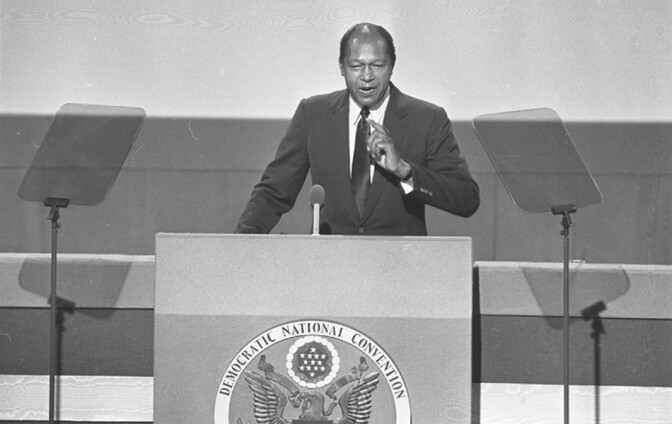1973 Tom Bradley Elected L.A. Mayor; 1st Black Mayor of a Major U.S. City

https://www.kcet.org/kcet-50th-anniversary/may-1973-tom-bradley-elected-l-a-mayor-1st-black-mayor-of-a-major-u-s-city
L.A. Mayor Tom Bradley speaking at the Democratic National Convention in 1984. | Photo: L.A. Times/UCLA Library Digital Collections/Creative Commons License
On May 29. 1973, City Councilman Tom Bradley defeated the incumbent Sam Yorty to become the first L.A. Mayor of African American ancestry, as well as the first black mayor of a major U.S. city.
Born in Calvert, Texas to a sharecropping family, Bradley moved along with them to Los Angeles at the age of 7, where he grew up in what is now the Historic Filipinotown neighborhood near Temple Street. He was elected Student Body President of Polytechnic High School, which at the time was located near downtown L.A., and still had a majority white student body. He went on to attend UCLA to study Education, where in the late '30s he was also a star athlete on the track team along with a student from Pasadena named Jackie Robinson, who would go on to break his own color barriers years later. While in college, he joined the Kappa Alpha Psi fraternity and became its national President.
In 1940, Bradley joined the Los Angeles Police Department, which was 10 percent African American in terms of the number of officers then, and worked for $107 a month. He once told the L.A. Times in an interview, that despite being a police officer, he was still refused credit at department stores and denied service at restaurants. Bradley rose to the rank of Lieutenant, the highest rank for a black officer then, and also volunteered for and formed the LAPD's first Community Relations department.
While on the force, he grew interested in politics and law, volunteering for the successful city council campaign of Edward Roybal in 1949. He also joined and became president of the United Club, which was affiliated with the California Democratic Council, where he worked with and formed relationships with its white, Jewish, and Latino members. He then attended Southwestern School of Law in 1956, passing the Bar Exam. Bradley retired form the police force in 1962 to practice law.
In 1963 he was elected to L.A. City Council, representing the 10th District, the second-ever African American to serve on the council. He was re-elected four years later, and in 1969 made a bid for L.A. Mayor, losing to the incumbent, Sam Yorty in the runoff election, despite receiving the most votes in the primary.
In 1973, thanks to a campaign consisting of a coalition of the Jewish community, liberal whites, Latinos, and other groups, Tom Bradley successfully defeated Yorty to become not only the first African American to become Mayor of L.A., but the first African American to be elected mayor of a major U.S. city, especially one that did not have a black majority population.
In 1976 Bradley was brought to the national spotlight as Chairman of the Democratic National Convention in New York City, which nominated Jimmy Carter as the Democratic candidate for President. He was re-elected to his second and third terms, respectively, in 1977 and 1981, and unprecedented fourth and fifth terms as Mayor in 1985 and 1989. Bradley ran unsuccessfully for California governor twice, losing both times to Attorney General, and later incumbent Governor George Deukmejian.
Among Bradley's achievements were growing the city's downtown, which had been in decline since the end of World War II, and successfully bringing a subway system to Los Angeles, a promise from his first campaign as Mayor, which was finally realized during his last year of his last term. He also oversaw the 1980s expansion of Los Angeles International Airport, of which the international terminal was named for him. He also helped to increase ethnic diversity among the ranks of city employees, making it more reflective of the demographics of the city. His greatest achievement was bringing the 1984 Summer Olympics to Los Angeles, which exceeded all expectations as the most financially successful Olympics of all time.
However, Bradley's lowest moment was the 1992 Riots, six days of civil disobedience, violence, arsons, and looting. The blame for the inability to prevent or quell the disturbance was shared among Bradley and LAPD Chief Daryl Gates. He decided not to run for a sixth term in 1993, and joined a law firm after his long political career.
Bradley suffered a debilitating stroke in 1996 and died in 1998 at the age of 80 from a heart attack.